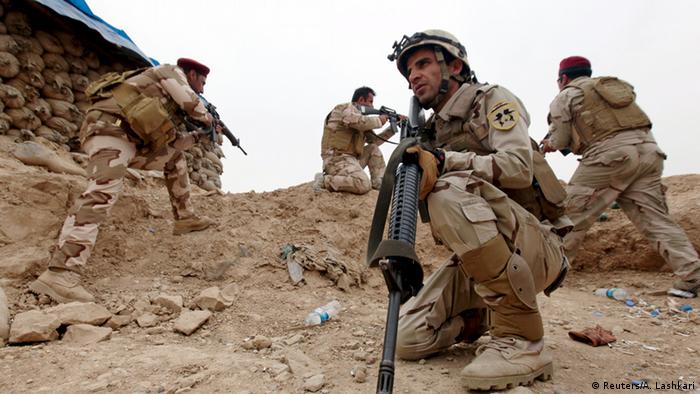Iraq's military offensive to recapture territory from the "Islamic
State" has been complicated by the presence of civilians trapped in
areas previously held by IS. Former prisoners are being freed.
Iraqi security forces recaptured parts of the city of Hit late Saturday.
It was one of the largest population centers still held by the "Islamic
State" (IS) in Anbar province.
Malallah al-Obeidi, an official in Anbar province, said Iraqi troops had managed to free about 1,500 prisoners who held by IS. Most of the captives were civilians.
But, as fighting continues, an estimated 20,000 civilians are trapped in and around the city of Hit, according to Iraqi military officers. That has left many people trapped, hemmed in by the advancing troops and by heavily armed IS fighters who have dug in to resist them.
"They honestly are just looking for a safe place they can reach quickly," a captain with Iraqi counterterrorism forces who is overseeing the Hit operation told the AP news agency. "They don't care if it is IS-controlled or not."
The captain said his soldiers were struggling to avoid civilian casualties when coordinating airstrikes. "We're telling the civilians to mark their houses in a certain way so we can tell who is and who isn't a fighter," he said.
The captain said his forces had initially asked civilians in Ramadi to carry white flags as they fled, but the symbol was quickly adopted by IS fighters. "It's not easy always coming up with new signs," the captain said, "the last time I saw a white flag it turned out to be a (car bomb)."
Trapped civilians complicate advance
Iraqi officers are now blaming the presence of great numbers of civilians for their relatively slow progress against IS.
"Militarily we could liberate Hit in just one day," General Abdul-Ghani al-Asadi told AP, "but we are having problems with the families stuck inside."
Large swaths north and west of Baghdad were captured by IS in 2014, but government forces have so far regained significant territory.
Iraqi forces began a broad offensive to retake Hit in mid-March, but a significant number of troops were diverted to Baghdad, which has been racked by political instability.
jar/jm (AP, AFP)
Malallah al-Obeidi, an official in Anbar province, said Iraqi troops had managed to free about 1,500 prisoners who held by IS. Most of the captives were civilians.
But, as fighting continues, an estimated 20,000 civilians are trapped in and around the city of Hit, according to Iraqi military officers. That has left many people trapped, hemmed in by the advancing troops and by heavily armed IS fighters who have dug in to resist them.
"They honestly are just looking for a safe place they can reach quickly," a captain with Iraqi counterterrorism forces who is overseeing the Hit operation told the AP news agency. "They don't care if it is IS-controlled or not."
The captain said his soldiers were struggling to avoid civilian casualties when coordinating airstrikes. "We're telling the civilians to mark their houses in a certain way so we can tell who is and who isn't a fighter," he said.
The captain said his forces had initially asked civilians in Ramadi to carry white flags as they fled, but the symbol was quickly adopted by IS fighters. "It's not easy always coming up with new signs," the captain said, "the last time I saw a white flag it turned out to be a (car bomb)."
Trapped civilians complicate advance
Iraqi officers are now blaming the presence of great numbers of civilians for their relatively slow progress against IS.
"Militarily we could liberate Hit in just one day," General Abdul-Ghani al-Asadi told AP, "but we are having problems with the families stuck inside."
Large swaths north and west of Baghdad were captured by IS in 2014, but government forces have so far regained significant territory.
Iraqi forces began a broad offensive to retake Hit in mid-March, but a significant number of troops were diverted to Baghdad, which has been racked by political instability.
jar/jm (AP, AFP)


No comments:
Post a Comment